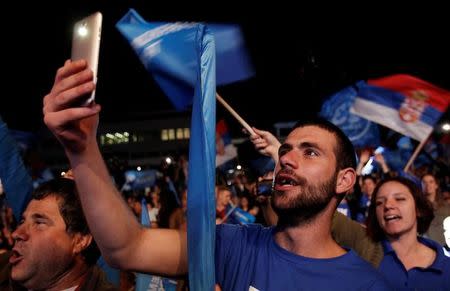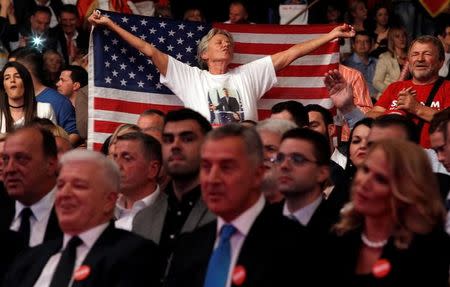Police arrest Serb plot suspects as Montenegro votes in crucial election
By Aleksandar Vasovic PODGORICA (Reuters) - Police in Montenegro arrested a group of Serbs suspected of planning armed attacks on Sunday, heightening election-day tensions as voters were asked to choose between closer ties with NATO or Russia in a crucial parliamentary poll. Twenty people, all citizens of neighbouring Serbia, were arrested overnight on suspicion of preparing armed attacks against state institutions on election night, national police chief Slavko Stojanovic said in a statement. "They entered Montenegro intending to get automatic weapons, and later this evening to attack institutions, the police, and representatives of the state, including top state officials," he said in the statement. Prime Minister Milo Djukanovic has presented Sunday's vote as a choice between continuing Western integration under his Democratic Party of Socialists or being reduced to a "Russian colony" under the opposition. NATO invited the tiny Balkan country of 620,000 to join last year, partly out of concern at Russian influence in Montenegro, which has strong cultural and commercial links to its traditional Orthodox Christian ally. In an interview with Reuters last week, Djukanovic accused Russia of channelling funds to Montenegro's opposition through Serbia and the Serb region of Bosnia in order to derail the country's progress towards joining NATO. Serbian Prime Minister Aleksandar Vucic told reporters on Sunday he had no information about the arrests in Montenegro and declined to comment, the Serbian news agency Tanjug reported. Russia and Montenegro's opposition deny Djukanovic's accusations. Opposition leaders say the charges are smokescreen to cover a culture of cronyism and organised crime that they say Djukanovic has allowed to flourish during his quarter-century of political dominance. Supporters of NATO membership say it will bring peace and prosperity, but the issue is divisive. NATO bombed Montenegro when the alliance intervened in 1999 to end a campaign of ethnic cleansing in Kosovo by Serbia, with which Montenegro was then in a state union. "Montenegro will continue its stable movement towards European and Euro-atlantic integration," Djukanovic, 54, said after voting on Sunday. The Ministry for Telecommunications said the website of Djukanovic's Democratic Party of Socialists and other media outlets close to the government were hacked on Sunday. A lack of reliable polls makes the election hard to call, but long-term allies have deserted Djukanovic. Leaders of the Democratic Front (DF), an alliance of pro-Serb and pro-Western parties, have suggested in recent remarks that they do not expect Djukanovic to step down peacefully if he loses. The former Yugoslav republic's economy has grown at a brisk 3.2 percent a year for the past decade, thanks mainly to foreign investment, much of it from Russia as well as China and Italy, targeting energy, mining and tourism in a country famed for its spectacular mountains and sea coast. Polling stations close at 1800 GMT, with first partial results expected an hour later. (Reporting by Aleksandar Vasovic; Editing by Thomas Escritt/Ros Russell)






